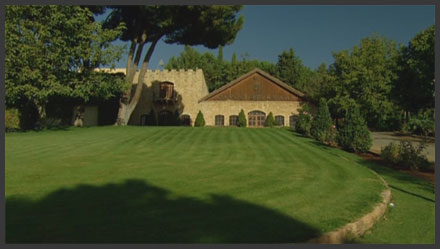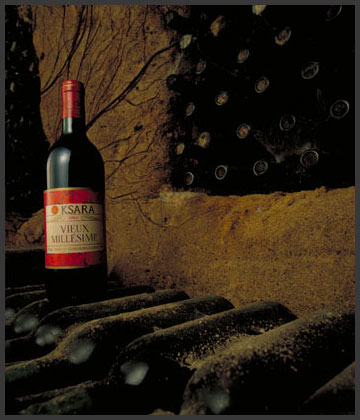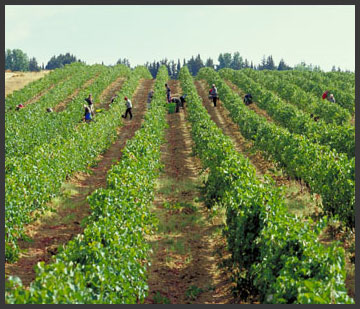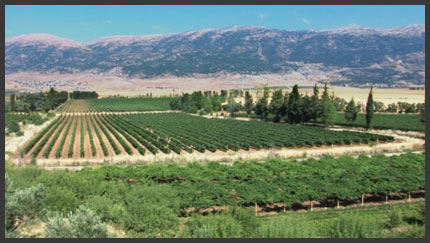Lebanese Wine – Making of Château Ksara
In 1857 the Jesuits discovered an ideal place for growing grapes and producing wine which is the Bekaa Valley. They started producing small quantities of wine in Ksara where they built a monastery. Then they started to import noble grapes from France and North Africa and thus, the production increased.
 The war in 2006 led to a considerable drop in the number of tourists. In 2007 the situation became better and continued to improve steadily reaching 1.8 million visitors in 2009. Half of these came from Europe and the US while the rest came from other Arab countries. There is plenty of room to increase this number.
The war in 2006 led to a considerable drop in the number of tourists. In 2007 the situation became better and continued to improve steadily reaching 1.8 million visitors in 2009. Half of these came from Europe and the US while the rest came from other Arab countries. There is plenty of room to increase this number.
In your opinion, what should be done to further stimulate growth of the tourism sector in Lebanon?
We undergo a security problem due to the extremely sad situation in the Middle East. We face many problems with our neighbors in the south and this is a handicap for us. We have been living with this situation for a long time. Furthermore, we need to improve our infrastructure because I don’t think it is up to the level that the tourists expect. Also, there is a huge concentration of 4 and 5 star hotels in Beirut but nothing like this in Baalbek, North or South Lebanon even though these regions could be thriving tourist attractions.
What do you think regional tourism is lagging in Lebanon?
There is an infrastructural problem. When one spends hours on the road to move a few kilometers it is frustrating. Also, security is involved because tourists want to go to the safest places and unfortunately whenever there is even a small incident in south Lebanon it is widely publicized.
Chateau Ksara is the oldest winery in Lebanon. What is the history behind Chateau Ksara?
In 1857 the Jesuits discovered an ideal place for growing grapes and producing wine which is the Bekaa Valley. They started producing small quantities of wine in Ksara where they built a monastery. Then they started to import noble grapes from France and North Africa and thus, the production increased. Simultaneously, they discovered in Ksara natural caves with constant temperature and humidity all through the year. These caves are ideal for wine conservation. At the end of the nineteenth century, some French Jesuit priests were killed in the Bekaa Valley and the Ottomans, the rulers at that time, did not want to have problems with France. They compensated for the death of these priests and offered France the Taanayel Property, an area of 240Ha at about three kilometers from Ksara.
“All these factors together, the land, the climate,
the caves, the Jesuits’ know how…, made of Ksara
a pioneer in the wine production in the whole area. “
 anese businessmen. Soon after, the war started and Ksara faced very difficult times which ended in 1990, when the war ended. At that time, I became the Chairman of the Board and we started a huge modernization process, confirming our position as the Market leader with 2.7 million bottles produced per annum, roughly 60% red, 20% rosé and 20% white, our wines being exported to more than 30 countries.
anese businessmen. Soon after, the war started and Ksara faced very difficult times which ended in 1990, when the war ended. At that time, I became the Chairman of the Board and we started a huge modernization process, confirming our position as the Market leader with 2.7 million bottles produced per annum, roughly 60% red, 20% rosé and 20% white, our wines being exported to more than 30 countries. How would you describe the types of wine Chateau Ksara produces?
One of our main concerns was to improve the vineyards situation, which were very damaged by the war. We imported and planted noble grapes and were the first in the country to grow our vines on wires.
What is your vision for Chateau Ksara and the Bekaa Valley in five to ten years?
Chateau Ksara has been developing in a very sustained manner. We have doubled production since I became the Chairman. Our current production levels are a reflection of our current achievements, we intend to stop expanding for the time being, to optimize our production and to sell it in the best conditions possible. Roughly, half of our products are sold in Lebanon whereas the other half are exported to countries like Syria, France, the UK, the US, Canada, Scandinavian countries, etc.
“In Lebanon there are more than thirty producers
of wine, the majority being in the Bekaa Valley. “

Normally we appoint distributors in the countries of interest. We try to find distributors who share our values and principles and who are well introduced in the wine business. Our Export Manager visits regularly our distributors to help them in the penetration and the promotion. For the future, our main attention goes to the Far East where our presence is symbolic and the Market is huge. We are also very interested in the South American Market.